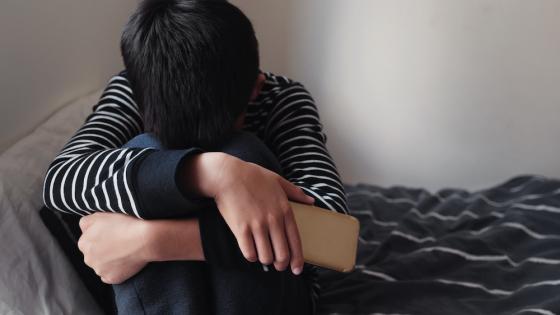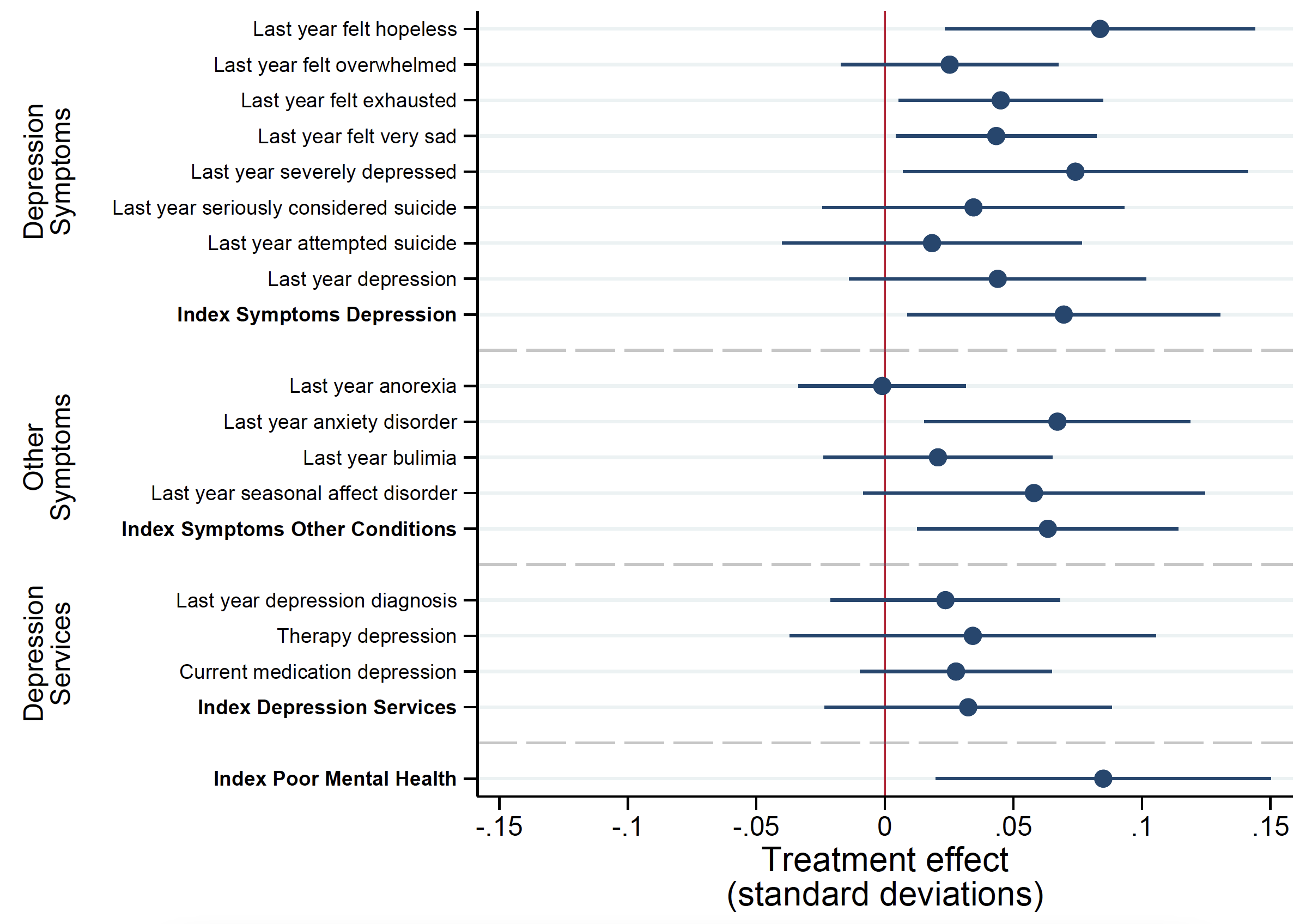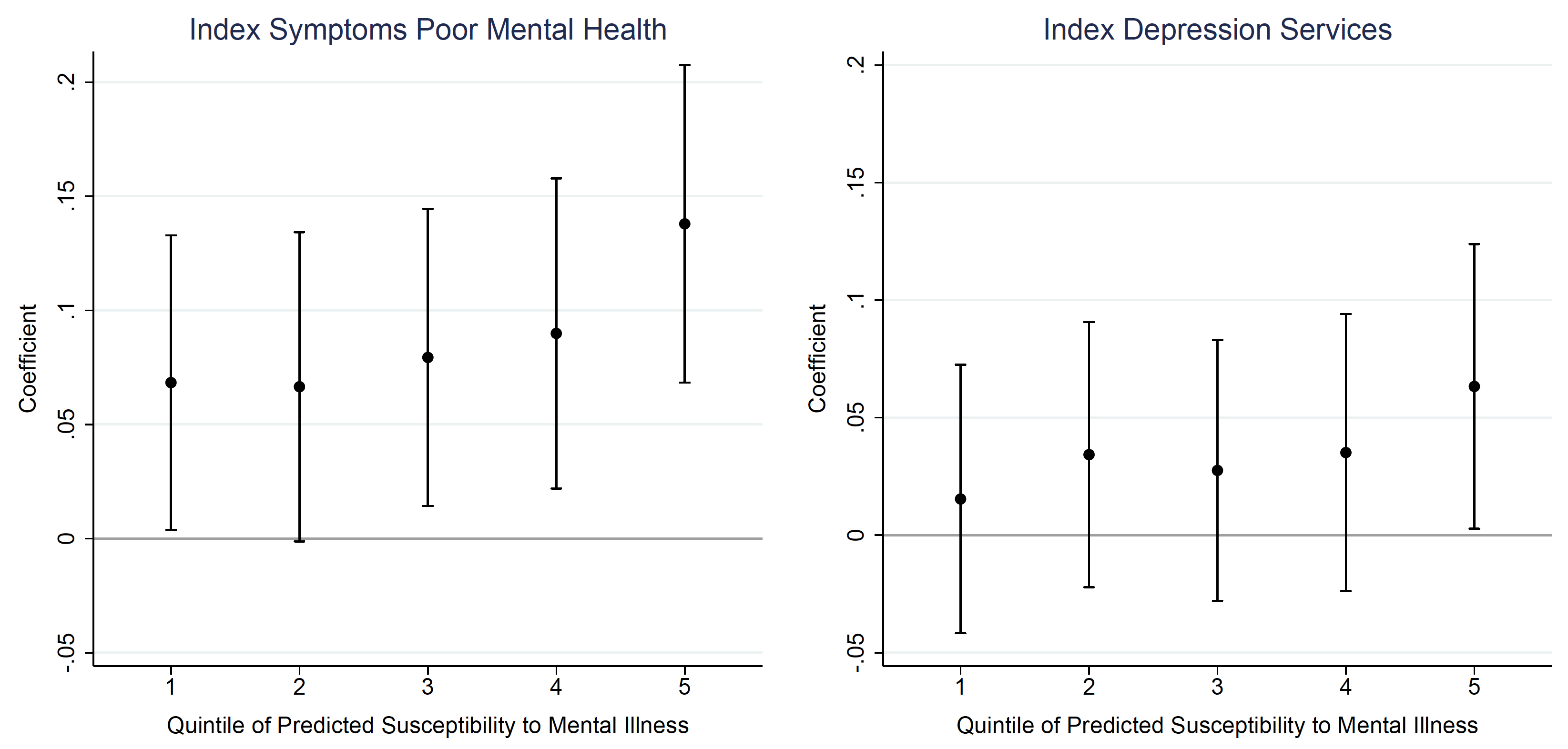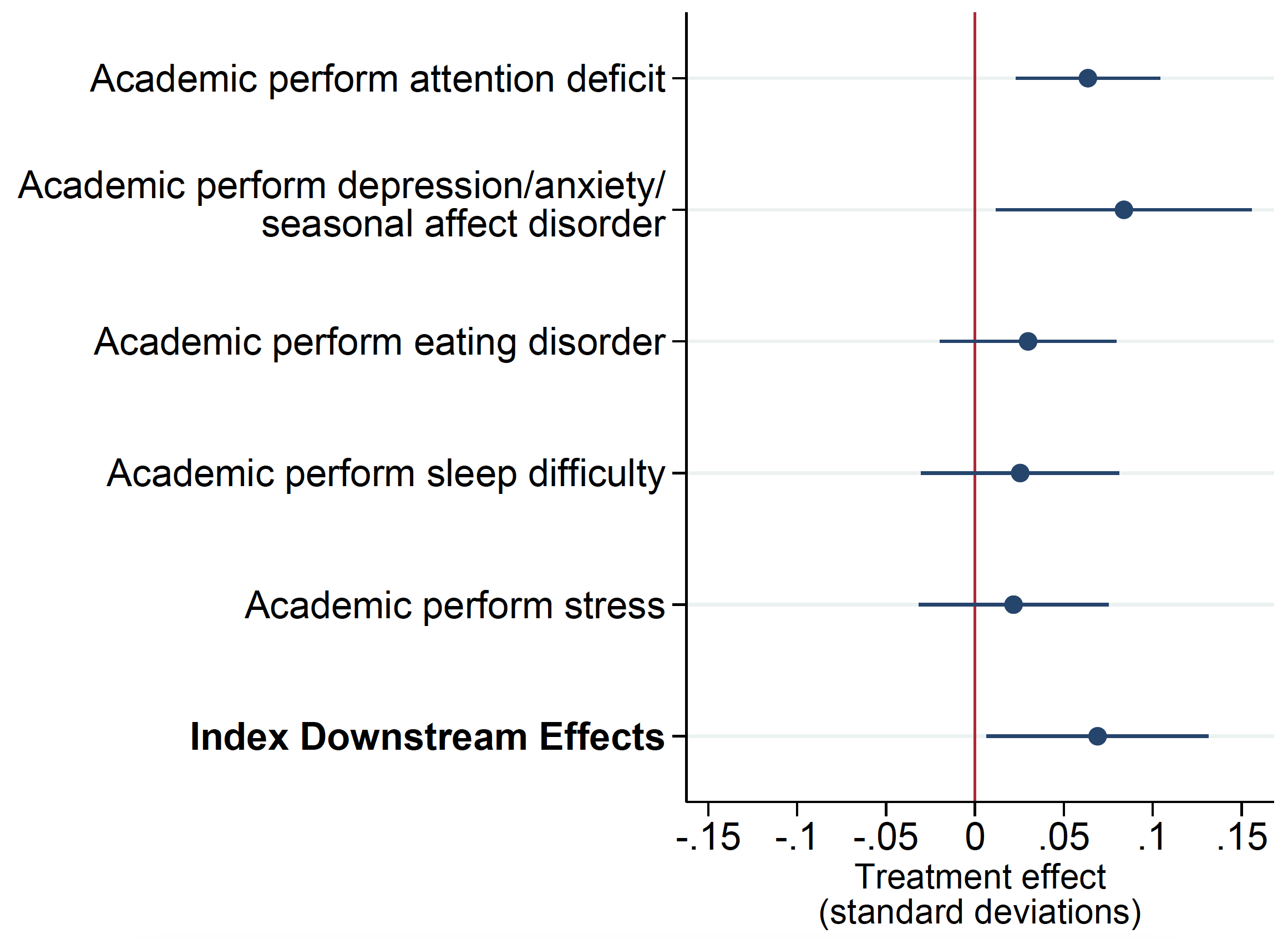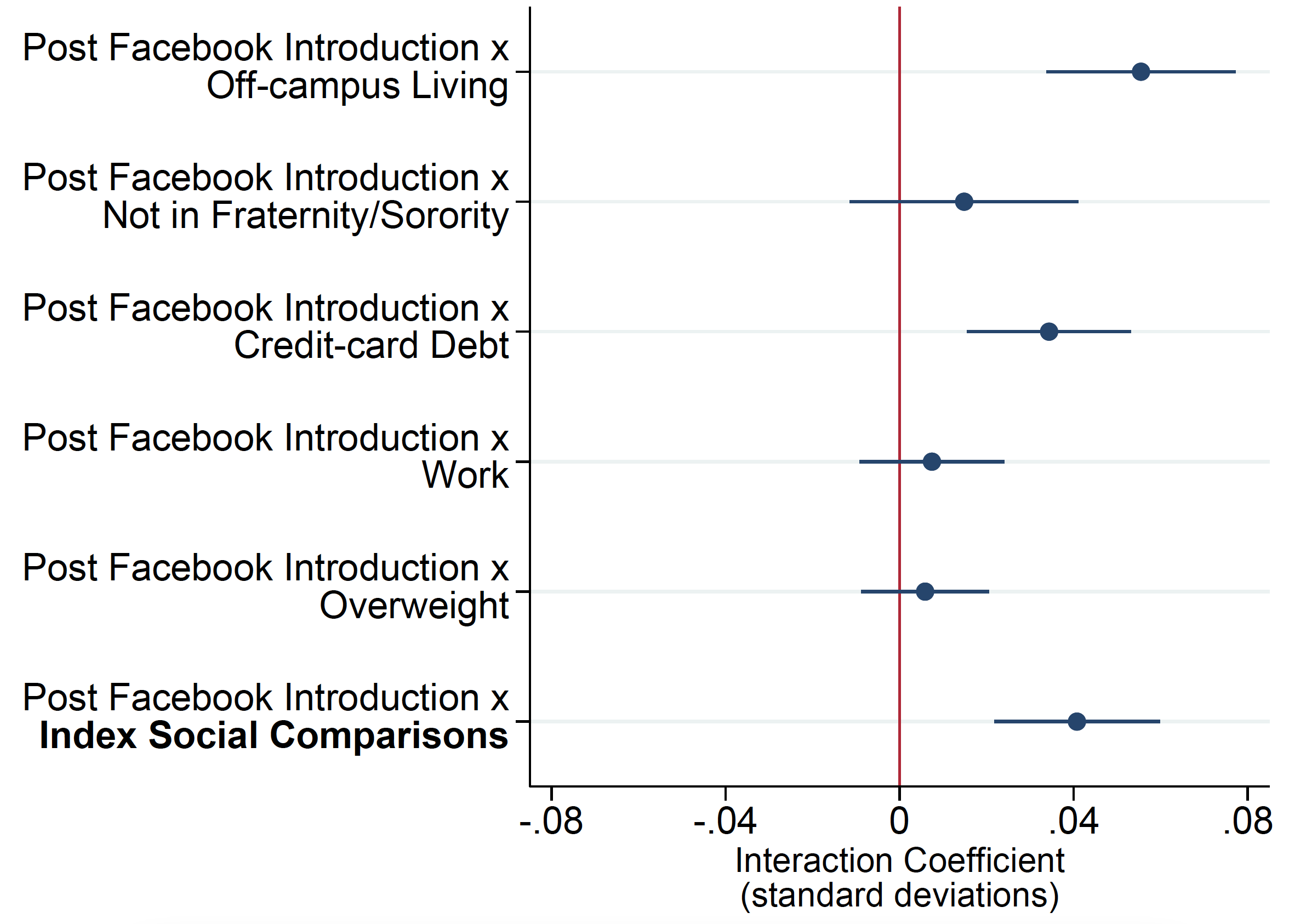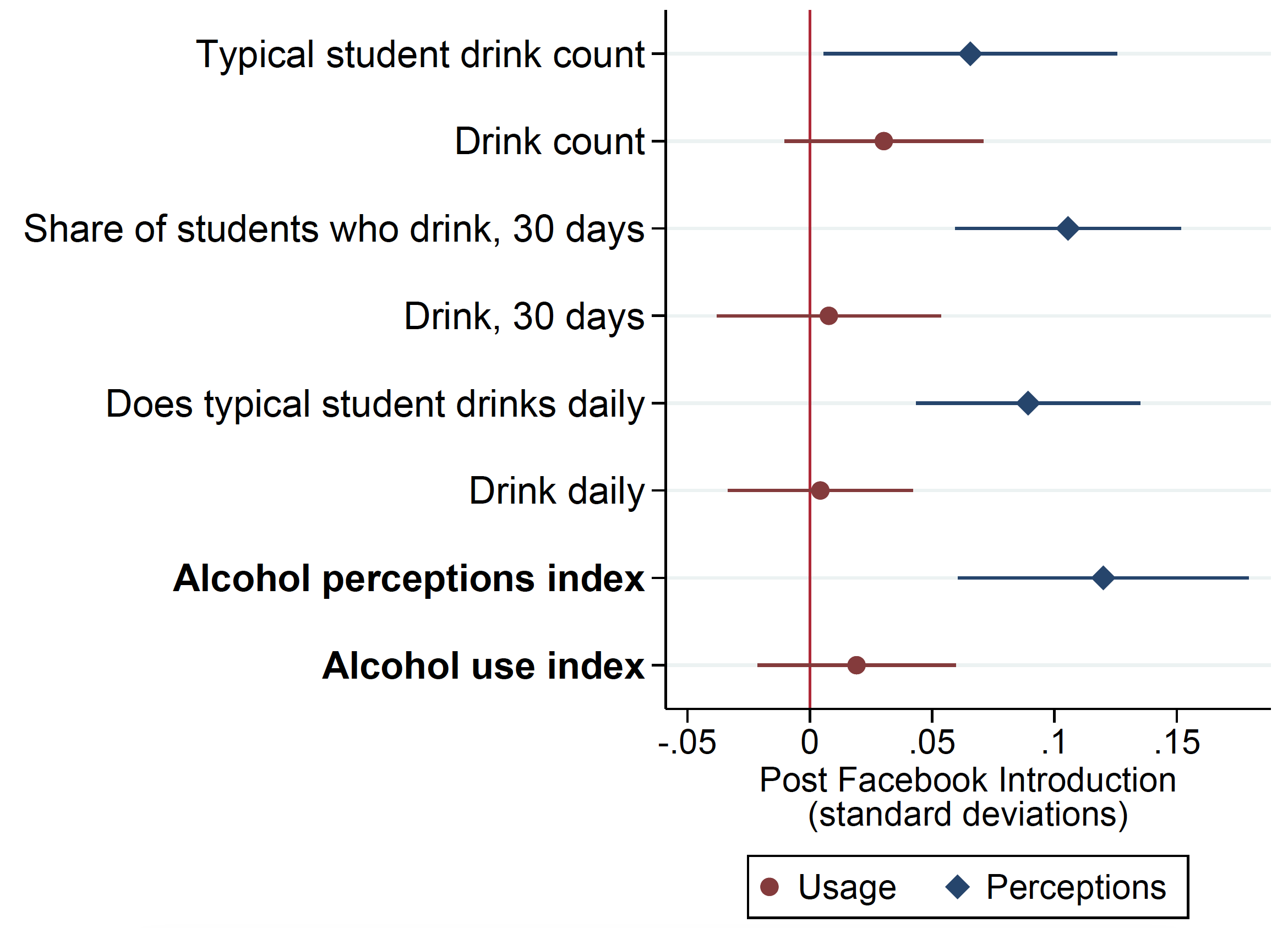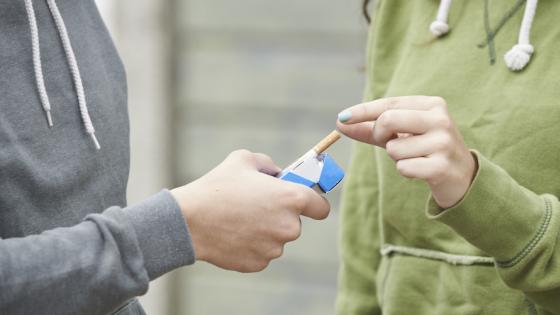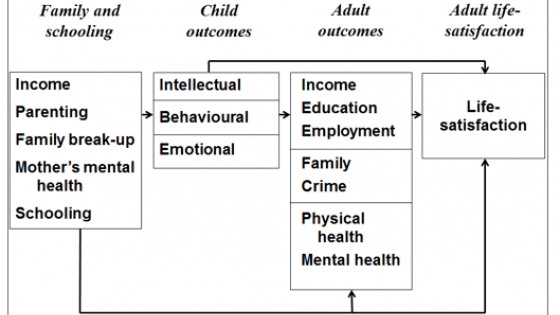Over the last two decades, the mental health of adolescents and young adults in many countries has worsened considerably (Twenge et al. 2019). Data from the US show that the fraction of individuals aged 18–23 who reported experiencing a major depressive episode in the past year almost doubled between 2008 and 2018 (NSDUH 2019). Similarly, over the same time period, suicides became more prevalent and are now the second leading cause of death for individuals 15–24 years old (National Center for Health Statistics 2021).
Since the increased prevalence of mental illness among adolescents and young adults coincided with the diffusion of social media, researchers, journalists, and policymakers alike have expressed concern that the two phenomena might be related (Twenge and Campbell 2019). In the autumn of 2021, a series of articles in the Wall Street Journal alleging that Meta (previously Facebook) was aware that Instagram had a negative effect on teenage girls’ body image brought the relationship between social media and mental health to the forefront of public debate (Wells et al. 2021). Soon after, the US Congress held a committee hearing on the topic.
Despite the urgent need for studies on whether social media is detrimental to mental health, causal evidence remains scarce. In a recent paper (Braghieri et al. 2022), we provide the most comprehensive causal evidence to date on the effects of social media on mental health by leveraging a unique natural experiment: the staggered roll-out of Facebook across US college campuses. Our empirical strategy allows us to estimate the short-to-medium-run effects of Facebook on a rich set of mental health outcomes ranging from depression, to generalised anxiety disorder, to anorexia. Overall, we find that the introduction of Facebook at a college had a negative effect on student mental health, especially as far as depression and anxiety disorder are concerned.
Our research design leverages Facebook’s gradual expansion across US colleges as a natural experiment. Facebook was created by Harvard undergraduate Mark Zuckerberg in February 2004. Initially, access to the platform was limited to Harvard students. Over the subsequent two and a half years, Facebook gradually expanded to other colleges in the US and abroad until eventually, in September 2006, it opened its doors to everyone in the world above the age of 13. The staggered nature of Facebook’s roll-out allows us to compare, in a difference-in-differences framework, changes in student mental health in colleges that just received Facebook access to changes in student mental health in colleges still without Facebook access.
Figure 1 presents the causal difference-in-differences estimates of the impact of Facebook on mental health outcomes. The results show that the introduction of Facebook at a college had a negative impact on student mental health. The effects we find are strongest for depression and anxiety disorder. College-wide access to Facebook increased the number of students who reported experiencing severe depression or anxiety disorder in the last year by 7% and 20%, respectively. In contrast to depression and anxiety disorder, we do not find significant effects on self-reports of anorexia and bulimia.
Figure 1 Effects of the introduction of Facebook on student mental health
In order to study whether the effects of Facebook are concentrated among individuals who are particularly vulnerable to mental illness or whether they affect all students in a similar way, we created a measure of predicted susceptibility to mental illness and studied how the effects of the introduction of Facebook vary along that measure. As shown in Figure 2, Facebook affects the mental health of all students, but the effects are especially strong among students predicted to be most susceptible to mental illness. Furthermore, among those students, the introduction of Facebook led to statistically significant increases in the take-up of psychotherapy and antidepressants.
Figure 2 Heterogeneous effects by predicted susceptibility to mental illness
Does the effect of Facebook on mental health have negative downstream repercussions on academic performance? According to the students’ reports, the answer is affirmative. As shown in Figure 3, students were more likely to report that mental health issues negatively affected their academic performance after Facebook was introduced at their college. Consistent with our evidence suggesting that depression and anxiety-related disorders are the conditions most severely affected by the introduction of Facebook, we find the largest point estimate on a question asking about depression, anxiety, and seasonal affect disorder. The number of students who reported that those conditions impaired their academic performance increased by three percentage points over a baseline of 13% as a result of the introduction of Facebook.
Figure 3 Downstream effects on academic performance
What is the mechanism behind Facebook’s negative effect on mental health? Overall, our evidence is most consistent with the idea that Facebook might encourage social comparisons, which, if unfavourable, might be detrimental to users’ self-esteem and mental health.
We find two pieces of evidence suggesting that the effects of Facebook on mental health operated through unfavourable social comparison. First, we focus on students who are more likely to be affected by unfavourable social comparisons and study whether they exhibit stronger effects. Specifically, we consider: (1) students who live off-campus and are therefore less likely to participate in on-campus social life; (2) students who have weaker offline social networks as measured by not belonging to a fraternity or sorority; (3) students who have lower socioeconomic status as measured by carrying credit card debt or working part-time alongside studying; and (4) students who are overweight. We aggregate these questions into an index of social comparison where respondents are considered to be at higher risk of unfavourable social comparisons if they have an above-median number of the characteristics described above (e.g. they live off-campus, are overweight, and have credit card debt). Figure 4 shows that Facebook access had a more negative effect on students more likely to suffer from negative social comparisons. All the point estimates are positive and the estimates for off-campus living, credit card debt, and the index are statistically significant.
Figure 4 Heterogeneous effects as evidence of unfavourable social comparisons
Second, we test directly whether Facebook affected perceptions of others' social lives by estimating the impact of the roll-out of Facebook on students’ perceptions of their peers’ drinking behaviours. Figure 5 shows that the introduction of Facebook increased the perceived prevalence of alcohol consumption among college students. Based on the questions asking students about their own alcohol consumption, the figure also shows that the increase in perceived alcohol consumption is not paralleled by an increase in actual consumption.
Figure 5 Effects on alcohol use and perceptions
One explanation for such discrepancy between perceptions and reality is that students might have a hard time interpreting the content they observe on social media. In particular, they might forget that what they see on social media is a curated rather than representative version of their peers’ lives. Indeed, we find even stronger effects on perceptions among students living off-campus who have to rely more heavily on social media to gather information about their peers’ behaviours. If students do not fully internalise the fact that the content they observe on social media is highly curated rather than representative, they might perceive many comparisons as unfavourable. In fact, inflated self-portrayals on social media, coupled with a degree of naivete in interpreting information on social media, might lead two students comparing themselves to each other to both perceive the comparison as unfavourable.
We emphasise that the analysis in our most recent paper does not aim to estimate the overall welfare effects of social media; rather, it aims to shed light on a very important component of such welfare calculation, namely mental health. Clearly, social media might have positive effects on other outcomes affecting welfare. Indeed, the fact that individuals keep using social media despite the negative effects on subjective well-being and mental health suggests that social media platforms might have benefits that compensate for their negative effects. Ideally, future iterations of these platforms will be able to preserve the benefits while mitigating the mental health costs.
Overall, the results from our paper support the hypothesis that social media might be partly responsible for the recent deterioration in mental health among young adults. It is up to social media platforms, regulators, and future research to determine whether and how these effects can be alleviated.
References
Allcott, H, L Braghieri, S Eichmeyer, and M Gentzkow (2020), “The welfare effects of social media”, American Economic Review 110(3): 629–676.
Allcott, H, M Gentzkow, and L Song (2021), “Digital addiction”, NBER Working Paper.
Armona, L (2019), “Online Social Network Effects in Labor Markets: Evidence From Facebook’s Entry into College Campuses”, available at SSRN 3381938.
Braghieri, L, R Levy, and A Makarin (2022), “Social media and mental health”, Working paper.
Bursztyn, L, G Egorov, R Enikolopov, and M Petrova (2019), “Social media and xenophobia: evidence from Russia”, Working paper.
Enikolopov, R, A Makarin, and M Petrova (2020), “Social media and protest participation: Evidence from Russia”, Econometrica 88(4): 1479–1514.
Enikolopov, R, M Petrova, and K Sonin (2018), “Social media and corruption”, American Economic Journal: Applied Economics 10(1): 150–74.
Fergusson, L and C Molina (2020), “Facebook causes protests”, Working paper.
Fujiwara, T, K Müller, and C Schwarz (2021), “The effect of social media on elections: Evidence from the United States”, NBER Working Paper 28849.
Levy, R (2021), “Social media, news consumption, and polarization: Evidence from a field experiment”, American Economic Review 111(3): 831–70.
Mosquera, R, M Odunowo, T McNamara, X Guo, and R Petrie (2020), “The economic effects of Facebook”, Experimental Economics 23(2): 575–602.
Mueller, K and C Schwarz (2020), “From hashtag to hate crime: Twitter and anti-minority sentiment”, available at SSRN 3149103.
National Center for Health Statistics (2021), “Health, United States, 2019: Table 007”.
NSDUH (2019), 2002–2019 National Survey on Drug Use and Health Final Analytic File (Codebook).
Twenge, J M and W K Campbell (2019), “Media use is linked to lower psychological wellbeing: evidence from three datasets”, Psychiatric Quarterly 90(2): 311–331.
Twenge, J M, A B Cooper, T E Joiner, M E Duffy, and S G Binau (2019), “Age, period, and cohort trends in mood disorder indicators and suicide-related outcomes in a nationally representative dataset, 2005–2017”, Journal of Abnormal Psychology 128(3): 185.
We Are Social (2021), Digital 2021 April Global Statshot Report.
Wells, G, J Horwitz, and D Seetharaman (2021), “Facebook knows Instagram is toxic for teen girls, company documents show”, Wall Street Journal, 14 September.
Zhuravskaya, E, M Petrova, and R Enikolopov (2020), “Political effects of the internet and social media”, Annual Review of Economics 12: 415–438.
Endnotes
1 A few studies incentivise randomly selected participants to reduce their social media use and hence do estimate causal effects, but they do not focus primarily on mental health (Allcott et al. 2020, 2021, Mosquera et al. 2020).
2 The paper relates to an emerging literature exploiting the expansion of social media platforms to study the effects of social media on a variety of outcomes. The empirical strategy adopted in this paper is closely related to the one in Armona (2019), who leverages the staggered introduction of Facebook across US colleges to study labour market outcomes more than a decade later. Enikolopov et al. (2020) and Fergusson and Molina (2020) exploit the expansion of the social media platform VK in Russia and of Facebook worldwide, respectively, to show that social media use increases protest participation. Bursztyn et al. (2019) and Mueller and Schwarz (2020) exploit the expansion of VK and Twitter, respectively, and find that social media use increases the prevalence of hate crimes. Additional research on social media and political outcomes includes Enikolopov et al. (2018), Fujiwara et al. (2021), and Levy (2021). For a detailed overview, see Zhuravskaya et al. (2020).
3 At the time, content related to alcohol featured prominently on Facebook.
